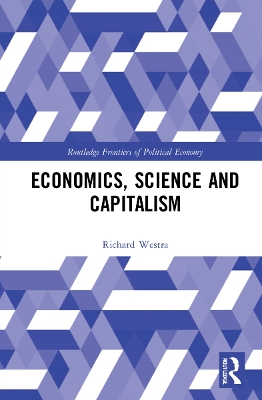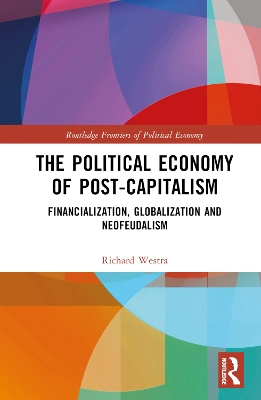Routledge Frontiers of Political Economy
1 primary work • 4 total works
Book 124
Based upon distinguishing capitalism from other economic systems, as well as analysis of capitalist change across its stages of development, Richard Westra argues that the economic tendencies we refer to as globalization constitute a world historic transition away from capitalism. Westra forcefully rejects claims from both Right and Left sides of economic debate that globalization embodies the ultimate world diffusion of capitalism. He concludes that the choice facing humanity is no longer between capitalism and socialism but between socialism and global barbarism.
The argument is meticulously interwoven through four key foci of political economy -
- The role of Marx's Capital in producing knowledge of capitalism,
- The periodizing of capitalism and study of its historical models,
- The altering trajectories of production and finance under current globalization,
- The place of socialism in a progressive future.
A central point of the book is that determinations over the capitalist substance of existing economies demand precise understanding of how in its basic operation capitalism manages to secure the economic reproducibility of human society in the first place. To make the case for the passing of capitalism from history the volume draws upon the novel Japanese Uno approach to Marxian political economy.
From the pages of Political Economy and Globalization emerges a grim picture of our human future should current economic trends persist. It also offers a positive vision for socio-material betterment in redistributive, eco-sensitive socialist societies of tomorrow. This is a must read book for scholars, students, progressive policy makers and activists.
Exit from Globalization moves from theory to practice: from questions of where incorrigible knowledge of substantive economic life derives and how that knowledge is put towards making a progressive, redistributive, eco-sustainable future of human flourishing.
Westra discards at the outset views that the root of current economic ills is the old devil we know, capitalism. Rather, he maintains the neoliberal decades spawned a "Merchant of Venice" economic excrescence bent upon expropriation and rent seeking which will scrape all the flesh from the bones of humanity if not stopped dead in its tracks. En route to providing a viable design for the human future in line with transformatory demands of socialists and Greens, Westra exorcizes both Soviet demons and ghosts of neoliberal ideologues past which lent support to the position that there is no alternative to "the market".
Exit from Globalization shows in a clear and compelling fashion that while debates over the possibility of another, potentially socialist, world swirl around this or that grand society-wide scheme, the fact is that creative future directed thinking has at its disposal several economic principles that transformatory actors may choose from and combine in various ways to remake human economic life. The book concludes with an examination of the various social constituencies currently supporting radical change and explores the narrowing pathways to bring change about.
Various strains of heterodox economics have sought, and largely failed, to dismount orthodoxy from its dominant position. This book critiques the criticizers, explaining why heterodox economics challenges have faltered, and then presents a coherent alternative paradigm of its own. This simultaneously exposes the vacuousness of neoclassical economics, the limitations of heterodox critique and the subverting of Karl Marx’s revolutionary economic thought by his own disciples.
The book draws in particular on two key intellectual traditions in making its arguments: critical realism and Marxism. From the refounding of critical realist philosophy of science in the hands of Roy Bhaskar, emphasis is placed upon the position that the ontological nature of the object of study determines the form of its possible science. However, in their theoretical constructions, neither orthodox economics nor heterodox economics problematizes the unique ontology of capitalism to the detriment of knowledge about the social world. The book maintains that a century of misthinking over Marx’s corpus has resulted in a missed opportunity to construct a paradigmatic alternative to orthodox economics. Drawing upon the tradition of the Japanese Uno approach to Marxism, and supported by Bhaskar’s development of critical realism as underlaborer for science, the book defends Marx’s writing in his monumental Capital as founding an economic science adequate to its ontological object of study. It then elaborates upon how Marxian economic theory exposes the hidden scourges of capitalism and what is required to unleash the potential of this theory for comprehensive analysis of capitalist vicissitudes, the study of economic life in precapitalist societies and the design of a desperately needed postcapitalist social order.
Broadening its appeal as it sets out to reclaim Marx’s revolutionary legacy, this original volume critically traverses writings in mainstream and heterodox economics, cutting edge philosophy of science and Marxian political economy and introduces readers to a reconstruction of Marx’s Capital engineered in Japan. This provocative book is essential reading for everyone interested in heterodox economics, critical realism, Marxian economics and critiques of capitalism.
It has become clear that instead of constituting the end of history or ending in its supplanting by socialism, capitalism has been outpaced by history and transmuted into something else. In this book, Westra explores the literature on the current state of capitalism ranging from questions of financial system and technological change through evidence of shifting class contours to a far more predatory constellation dubbed neofeudalism.
In seeking to expose the dire consequences for humanity of capitalist unravelling, this book remedies the lacunae and disparateness of current writings which leave fundamental questions of what precisely capitalism is or was and the historical delimitations of capitalism unanswered. Westra not only critically analyzes the arguments over capitalisms passing under key rubrics of financialization, globalization, intangible assets and social class, unveiling interconnections among perspectives, but grounds determinations over the existence of capitalism in a novel synthetic definition of it. Thus, while capitalism has always been an exploitative, asymmetric wealth distributive, alienating, class divisive, crises ridden society, Westra explains how, supported by neoliberal state policies, the economic transmutations the book treats undermine what coherence capitalism maintained for human economic affairs to the existential detriment of society.
This book will be of interest to academics and students across fields of economics, political economy, economic history, political science and sociology as well as to progressive policymakers and social activists.



